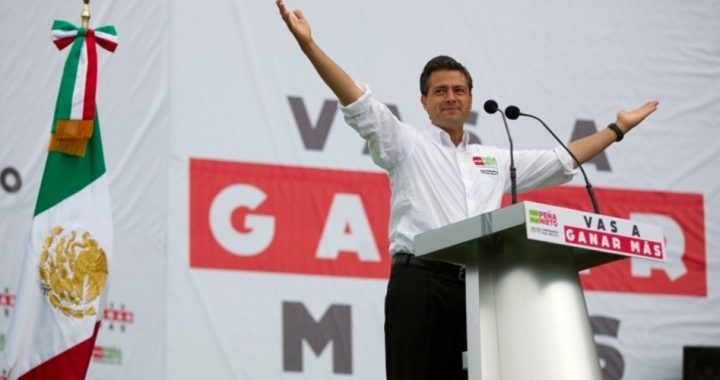
While Americans are embroiled in discussions of the various implications of this year’s presidential contest, very few of them are weighing the significance of a presidential election that will take place tomorrow just across the southern border of these United States. The candidates of three major parties are vying for the presidency of Mexico, and no matter which candidate wins, he — or she — will face the task of rebuilding a nation devastated by years of war and economic crisis.
Since 2006, the reign of Felipe Calderon has been defined by the “drug war” that he launched in December of that year against Mexico’s powerful drug cartels. Earlier this week the world was given another poignant reminder of the brutality of the struggle between the government and the cartels — and the blurring of the line between those two parties — when a shootout in the Mexico City International Airport left three federal police officers dead. The confrontation began when drug smugglers — who were also federal police officers — were allegedly caught seeking to transport cocaine. As reported previously for The New American, the government later referred to the incident as a “quarrel,” and failed to mention the casualties, even as the public was assured that the airlines “are carrying on normally and this situation does not in any way affect operations” — a clear example of the surreality of the reigning situation in Mexico.
The Mexican electorate has been presented with candidates who invite comparison to those of current and past elections north of the border. The leading candidate is Enrique Pena Nieto (photo at top) of the Institutional Revolutionary Party (PRI), which ruled Mexico from 1929 until 2000, when the more “conservative” National Action Party (PAN) came to power. During the years of its stranglehold on Mexican politics, the actions of the PRI came to be characterized by a record that alienated a significant portion of the electorate; as NNDB has summarized it, the PRI came to “symbolize corruption, electoral fraud, and privatization of previously nationalized industries.”
After 12 years out of power, the PRI appears to be on the verge of resuming its previous dominance, and Nieto is the candidate that the party faithful are counting on to accomplish that return to power.
In American terms, one might be tempted to view Nieto in terms that parallel several American candidates. A recent article for MSNBC.com offered a synopsis of Nieto’s record:
A trained lawyer with influential relations within the PRI, the impeccably groomed Pena Nieto has held a double-digit lead for nearly the whole campaign despite revelations that might have derailed his bid in other countries.
In January, he admitted cheating on his first wife and fathering two children out of wedlock with different women, an indiscretion that had little impact on his ratings.
He drew more scorn for struggling at a book fair to name three books that had influenced him, and his close ties with Mexico’s dominant broadcaster Televisa drew a wave of youth protests against him towards the end of the race.…
He was seen as an effective state governor, significantly increasing infrastructure spending during his tenure.
He has a cozy relationship with Mexico’s most powerful broadcaster Televisa. His first wife died in 2007, and his fame grew when he married a popular soap opera actress in 2010.…
Critics say his popularity owes much to the support of entrenched business interests in Mexico, and that the need to return the favors could weaken his presidency.
If Nieto is the candidate who is supposed to mark a change from the past, critics would certainly ask whether that change is for the better. Intellectual shallowness and a rakish lifestyle hardly seems like the candidate for restoring a broken nation, but public anger toward Calderon and hopelessness regarding conditions throughout Mexico are powerful motivating factors.
Nieto’s most significant opposition comes from the Left, with the candidacy of Lopez Obrador of the Party of the Democratic Revolution (PRD). The PRD was formed in 1989 as a merger of Mexico’s hard Left parties, including the Mexican Communist Party, the Unified Socialist Party of Mexico, the Socialist Mexican Party, and the Mexican Workers’ Party. Despite past political obscurity, the PRD now claims the support of a substantial portion of the Mexican public. Polls place Obrador somewhere between 8 and 17 percentage points behind Nieto in tomorrow’s election, but the fact that such extreme views could move to such a position of prominence says much regarding the state of affairs in the nation as a whole. According to press reports, much of Obrador’s support has come from his appeal to the youth vote, and appeals to economic nationalism. The fact that he has promised to end the military’s role in the ongoing drug war has proven popular, as well. Still, even MSNBC had to concede that his critics describe him as “hot-headed and undemocratic” — not an uncommon designation for leftists playing the “Populist” card.
Compared to the candidacy of Obrador, Nieto’s is probably less concerned with the PAN candidate, Josefina Vazquez Mota. If her role as Mexico’s first female candidacy was supposed to rally the support of Mexican women, that has not yet proven to be the case. An article for The Economist notes that many of Vazquez’s allies are her worst enemies, including former PAN president Vincente Fox:
Mr Fox, who was president between 2000 and 2006, is a sort of Mexican George W. Bush when it comes to incautious comments. (“Mexican migrants do the jobs that even the blacks don’t want to do” gives a flavour of his way with words.) When he said in April that Ms Vázquez could win only with a “miracle”, her supporters groaned. His comment on June 3rd that “A clear winner is emerging…. We have to close ranks behind who will win” was even worse, a clear reference to Enrique Peña Nieto of the Institutional Revolutionary Party (PRI), who is well ahead in nearly all polls.
It’s not clear whether Mr Fox is actively trying to sabotage his colleague’s campaign or whether he is just doing it by mistake. The party described his comments as “incongruous, contradictory and absurd”. But he isn’t the only one to have been lukewarm in his support for Ms Vázquez. Felipe Calderón, the president, made it clear that his own preferred candidate was Ernesto Cordero, a former finance secretary.
And, as noted in the MSNBC article, Vazquez’s ongoing support for the catastrophic drug war has certainly not helped her candidacy with the general electorate. Unreflective support for failed wars have a way of alienating those who are expected to suffer or die in the unending conflict.
Given the choice between the Playboy, the Socialist, and the Status Quo, it is little surprise that the people of Mexico may conclude, once again, that theirs is a choice between various evils — the only difference being which one believes to be the “lesser” among them.
Photo of Enrique Pena Nieto: AP Images



